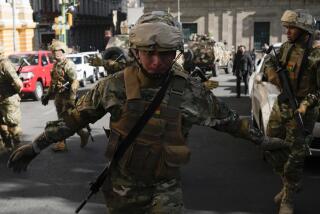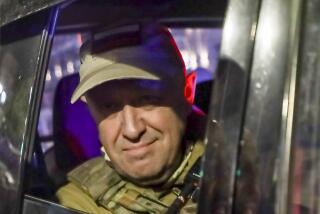Mutinous Troops Seize Base in Georgia
- Share via
MOSCOW — Frustrated by months without pay, a battalion of the Georgian republic’s national guard took its armored vehicles on the road without warning or permission Friday and seized a military base close to the capital, Tbilisi.
The movement prompted fears of a coup d’etat. It took a meeting between Georgian President Eduard A. Shevardnadze and rebellious officers to restore calm. The president said late Friday that the mutinous troops agreed to return to their garrison today.
For the onetime Soviet foreign minister, who was Mikhail S. Gorbachev’s top diplomat during the perestroika era, it was the latest demonstration of survival skills. He has managed to stay in power since 1992 despite a string of civil wars and attempted coups and assassinations.
But some wonder whether his luck might be starting to run out.
“People don’t want to go hungry and naked anymore. Salaries to the military and the police haven’t been paid for eight to 11 months,” said Ivlian Khaindrava, a prominent political analyst in Georgia. “Right now the position of Shevardnadze is the weakest in years.”
The latest problem began at 7 a.m. Friday when 300 to 400 men in a national guard battalion quit their garrison, fully armed and driving armored cars, and seized the nearby Mukhrovani base belonging to a division of Interior Ministry troops, which is about 18 miles from Tbilisi.
According to local journalists and an Interior Ministry official, up to 1,000 troops congregated during the mutiny before troops loyal to the government cut off access to the base.
“They are demanding improvements in work and social conditions--such as salary, ammunition and so on. There are about 1,000 people there, including lots of military officers. But there is no single leader among them,” said Maya Musidze, deputy head of the Interior Ministry press service.
Given the recent history of Georgia, a Caucasus state known for producing wine, fruit and Josef Stalin, the “unauthorized redeployment” set off alarms. Security was tightened at strategic sites around the capital, including parliament and the president’s office.
Defense Minister Lt. Gen. David Tevzadze went to talk to the disgruntled troops. Two deputies of parliament and the head of Georgia’s national guard also visited them without success.
It took Shevardnadze, arriving at the base by motorcade late Friday, to bring the situation under control.
Before going to the scene, the 73-year-old leader condemned the uprising as a “grave offense.” However, he offered words of conciliation, saying that the grievances were valid and that the mutineers would not be treated as criminals.
“Everything should be sorted out with a clear head,” he said.
In Georgia, the average monthly wage among the population of 5.5 million is $35.
Some soldiers appeared before TV cameras in masks, saying desperate financial straits sparked their action. “This is the only way we can draw attention to ourselves,” one said.
The commander of the mutinous battalion, Col. Koba Otanadze, was quoted by Russia’s Interfax news service as saying the troops wanted to draw attention to the collapse of Georgia’s military.
“The army does not exist today,” Otanadze said, citing poor living conditions and lack of pay. “Only the homeless or feebleminded children join.”
Khaindrava, the political analyst and a leader of the small Republican Party of Georgia, said by telephone from Tbilisi that the army had become “ragtag and barefoot.” In comparison with police, who at least can extort small bribes from motorists, a Georgian soldier’s existence is “pitiful,” he said.
“This is a cry of despair, a demonstration of extreme misery rather than any semblance of an organized or even spontaneous coup,” he said.
Georgia’s economy crashed after the fall of the Soviet Union in 1991, which cut the republic off from raw materials and markets for the industries built up in Communist times.
Strife also has taken its toll. A two-year civil war erupted after the northern region of Abkhazia declared independence in 1992--a conflict that eventually left Abkhazia a self-declared independent enclave and Georgia with 300,000 refugees. In 1993, there was another uprising, this time launched in western Georgia by supporters of the nation’s first president, Zviad Gamsakhurdia.
Shevardnadze was reelected last year, but unless the economy improves he may face other challenges, Khaindrava said.
“People are tired of waiting for signs of improvement that never come. The anger and discontent are now concentrated on Shevardnadze personally, and there are no new scapegoats,” he said.
More to Read
Sign up for Essential California
The most important California stories and recommendations in your inbox every morning.
You may occasionally receive promotional content from the Los Angeles Times.










